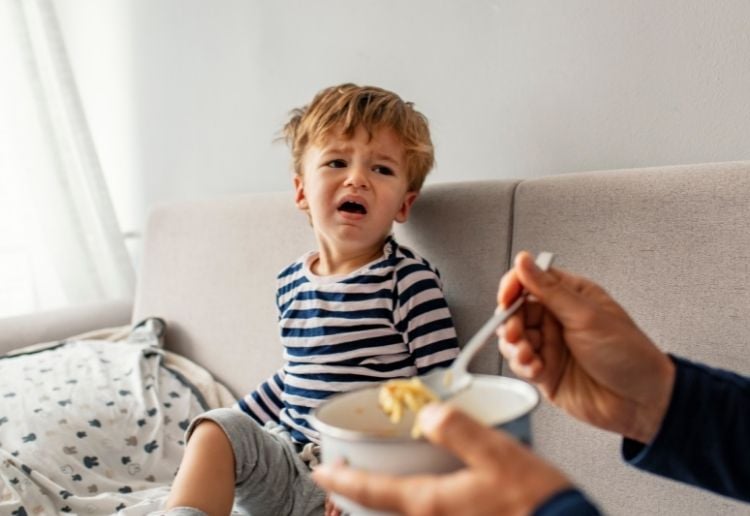Meet Eli. He entered the second year of his life with gusto and now, aged 18 months, he is discovering new things every day including ideas he wants to try out immediately. Like, right now. Waiting is not an option.
Combined with his passion for life he often becomes emotionally overwhelmed and erupts into frequent meltdowns. Words and phrases like “no”, “do it myself” and “mine” are used often.
Sometimes the smallest thing ends with Eli kicking, biting and crying. Although he’s still developing a command of words, he shouts “I don’t love you, Dad!” with devastating accuracy. These outbursts happen at home and out in public.
Research shows tantrums occur in 87% of 18 to 24-month-olds, 91% of 30 to 36-month-olds, and 59% of 42 to 48-month-olds – often on a daily basis.
The “terrible twos” might sound accurate, but branding toddlerhood (18 months to 36 months) this way is an injustice to this group. The generic label fails to grasp the huge developmental growth happening at this age. It also fails to celebrate the developing emotional life of a toddler, at once complex, multifaceted and exhilarating.
What’s going on?
Eli is at a “developmental touchpoint”, where a unique surge in capacities is coupled with behaviour falling apart. At this age, children begin to establish independence while simultaneously needing to learn ways of coping with intense feelings such as fear, anger, frustration and sadness. Researchers are still discovering what a normal trajectory for emotional regulation development looks like, and what might help or hinder it.
Intense, uncontrolled feelings and defiance are normal at this age. But it can be challenging for parents to support their toddlers through this stage.
Focusing solely on a toddler’s behaviour fails to capture the significant role sensitive care-giving plays in social and emotional development in the early years.
A core component of sensitive and responsive parenting is a parent’s capacity to put themselves into the mind of their very young child and understand the child’s behaviour has meaning and is driven by internal experiences such as feelings, thoughts, desires and intentions.
A child’s-eye view
Being able to understand the world from the child’s perspective helps a parent to anticipate, interpret and respond to the child’s behaviour in ways that build a child’s capacity to regulate their emotions.
Eli’s dad didn’t experience tantrums with his first child, who had a calmer disposition, so he finds Eli’s emotional outbursts hard to tolerate. He becomes angry when Eli refuses to do what he is told and yells at him to “stop it!”. This frightens Eli, who sometimes retreats and sometimes escalates in his distress.
Eli’s dad is unaware of his toddler’s internal experiences and is confused by his own “out-of-control” feelings when parenting him. Frequent emotional outbursts coupled with an authoritative parenting style places children at risk of developing more serious emotional and behavioural problems.
Eli’s dad needs to understand that his primary role at this stage is to put his child’s experiences at the centre of his mind. This requires him to try to make sense of what Eli is communicating about himself through his behaviour and to respond in a sensitive way. This can help a child like Eli not be overwhelmed by intense feelings.

3 guidelines for parents:
1. Be aware of your own responses
Tantrums can be emotionally activating for parents. Being aware and making sense of your own feelings will help you to respond sensitively to your child’s distress. When Eli’s dad makes sense of his struggles with managing anger, he is calmer, enabling him to focus on Eli’s emotional experiences.
2. Identify and validate your child’s difficult feelings
Young children need help from their parents to recognise that the feelings they are expressing through their behaviours are just that: feelings that will pass in time. They need help to name them, work out what is causing them and figure out what might help.
3. Search for underlying meaning
Remember not to take emotional outbursts personally. Viewing a tantrum as a means of communication helps parents consider the likely causes of a child’s distress and to think through possible solutions.
Making changes
With new insights, parents like Eli’s dad can can help their child put themselves back together again after emotional outbursts, which may be less frequent. With consistent support, toddlers can learn to tolerate frustration, gain a sense of control of strong feelings and find words to express what is happening inside them.
Parenting a toddler is no easy task. Today’s parents have the advantages of remarkable leaps in neuroscientific and developmental knowledge. However, these can be difficult to access and even more difficult to put into practice. Unwittingly we can fall back into the familiar ways we were parented, or we might attempt try to do the opposite of how we were parented only to find we have lost direction.
Investment in early intervention programs for everyone or at a targeted level where the parent-child relationship is in trouble, could provide the building blocks for lifelong emotional well-being for families and for society.![]()
Rochelle Matacz, Adjunct Senior Lecturer, Edith Cowan University and Lynn Priddis, Adjunct associate professor, The University of Western Australia
This article is republished from The Conversation under a Creative Commons license. Read the original article.




















7:54 am
2:07 pm
9:42 pm
10:53 pm
5:38 pm
6:21 pm
8:16 am
-

-
-
Mum2archer replied
- 23 May 2022 , 10:52 pm
Reply2:17 pm
9:06 am
10:00 pm
10:59 am
7:45 am
12:00 pm
10:01 am
5:39 pm
5:10 pm
2:13 pm
10:57 am
10:14 am
8:30 am
- 1
- 2
- »
Post a commentTo post a review/comment please join us or login so we can allocate your points.